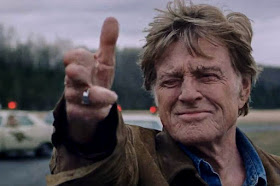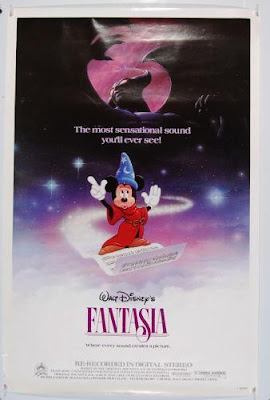As is usual, there are also a few surprises, including, perhaps, two of the most monumental recognitions in the Academy's history (and in cinema history, for that matter). Plus, this year's nominees represent another intriguing and diverse collection of styles, nationalities and ethnicities, ranging from African-American to Mexican, Polish, Egyptian, Greek, and Italian-American. (And I'm not specifically talking about foreign film categories here.)
 |
| (l-r) Lady Gaga in A Star Is Born, Chadwick Boseman in Black Panther, Yalitza Aparicio in Roma, and Olivia Colman in The Favourite |
IT'S A MAD, MAD, MAD, MAD WORLD
First things first. Two films have the most nominations this year (ten for each). One is set in Mexico City during the 1970s (which I'll get to later). The other is a wild and maddening period comedy-drama (as if the trailer isn't any indication) set in 18th Century England. Director Yorgos Lanthimos' The Favourite centers on a rivalry between two cousins vying for the affections and attention of Queen Anne. Actresses Olivia Colman, Emma Stone, and Rachel Weisz all received acting accolades for their performances, as did the film's original screenplay, editing, production design, costumes, and cinematography.
Obviously, it's the kind of film that would get Oscar recognition, making it a, um, favorite among Academy voters, despite its apparent unconventional and bizarre tone. The Athens-born Lanthimos has made a name for himself in recent years with such unconventional and provocative arthouse films as The Lobster (which his screenplay, shared with writer Efthymis Filippou, was nominated for in 2017) and The Killing of a Sacred Dear (2017). Stone (who's no stranger to such wild roles, considering her current role on the Netflix series, aptly titled, Maniac) was first nominated in a supporting role for Birdman back in 2015, before winning for her leading role in La La Land in 2017
Another provocative film that's been generating praise and discussion is Spike Lee's BlacKkKlansman, which earned the director some of his greatest accolades, including a Best Director nod (a first for the filmmaker, believe it or not). It's based on the true story of African-American officer Ron Stalworth, who investigates the Ku Klux Klan during the 1970s. Nominated for six awards, the blaxploitation-esque film marked the first time Lee had been recognized by the Academy since his 1998 documentary feature 4 Little Girls. (He did receive an Honorary Award by the Academy in 2015 for his career body of work.)
Adam McKay's piercing and scathing political satire Vice (which stars the versatile Christian Bale as former vice president Dick Cheney) earned eight nominations, and is only the director's second time tackling drama since winning for his adapted screenplay (shared with screenwriter Charles Randolph) for The Big Short back in 2016. As with that film, McKay was, once again, nominated for his directing and for his screenplay (an original one, this time). Bale undoubtedly was recognized for his physical and emotional committment to the title role.
 |
| Director Spike Lee and actor John David Washington behind the scenes of BlacKkKlansman |
 |
| Christian Bale and Amy Adams in Vice |
HUMAN DRAMA
McKay's not the only director to make a successful transition from comedy to drama. (He previously directed Anchorman and Step Brothers, lest we forget.) Peter Farrelly (one half of the infamous Farrelly Brothers, responsible for such "classics" as Dumb and Dumber and There's Something About Mary) helmed last year's winner of the People's Choice Award at the Toronto Film Festival, Green Book. Based on the real-life friendship between Italian-American bouncer Tony Vallelonga and African-American pianist Don Shirley, the film didn't fail the Academy with its winning performances (Viggo Mortenson and Mahershala Ali were nominated for their leading and supporting roles, respectfully), editing, original screenplay (co-written by Farrelly and Vallelonga's real-life son, Nic), and overall picture.
Alfonso Cuaron's personal project, Roma, has been getting universal acclaim since it debuted last fall at the Venice Film Festival. Shot in black and white, and inspired by Cauron's own childhood, Roma tells the story of a middle-class family in Mexico City during the 1970s, specifically from the perspective of their maid, who is reportedly based on the woman who helped raise the young Cauron. The film received ten nominations total, including four for Cauron, who does quadruple duty as the film's writer, director, co-producer (with Gabriela Rodriguez), and cinematographer.
This film also has the distinction of being one of only a few foreign films to be nominated in said category and as Best Picture of the Year. The only other films to do so included Grand Illusion (France, 1938), Z (France/Algeria, 1969), The Emigrants (Sweden, 1972), Cries and Whispers (Sweden, 1973), The Postman (Italy, 1995), Life Is Beautiful (Italy, 1998), Crouching Tiger Hidden Dragon (Taiwan, 2000), Letters From Iwo Jima (Japan, 2006), and Amour (Austria/France/Germany, 2012).
This is also the second year in a row that streaming service Netflix has had a nominated feature (the first being Mudbound last year), and their first Best Picture nominee. They are also recognized this year (in the original screenplay, original song, and costume design categories) for the Coen Brothers' latest anthology feature, The Ballad of Buster Scruggs.
 |
| Mahershala Ali in Green Book (left) and Rami Malek in Bohemian Rhapsody (right) |
AND THE BEAT GOES ON . . .
Bohemian Rhapsody (the biopic on the career and music of Queen and frontman Freddy Mercury) has received mixed reviews from audiences and critics since its release back in November, but has nevertheless produced some unexpected box-office success. (The film has thus far grossed more than $798 million worldwide.) Actor Rami Malek has been getting the most praise, for his performance of Mercury, which the Academy recognized as well. The film's unexpected Best Picture nod, perhaps, exemplifys the Academy's way of recognizing what the general public has praised.
Speaking of music, Bradley Cooper's impressive directorial debut, A Star is Born (the third time the 1937 original film has been remade, after 1954 and 1976, respectfully), has, not surprisingly, gotten several accolades (nine, total), not least of which was Lady Gaga's leading role. Now, thanks to a public vow they reportedly made, Cooper and Gaga are set to perform the hit song "Shallow" at the ceremony.
Gaga, along with Roma's Yalitza Aparicio, earned accolades for her feature-film debut. Other first-time nominees include Olivia Colman (The Favourite), Adam Driver (BlacKkKlansman), Richard E. Grant (Can You Ever Forgive Me?), Regina King (If Beale Street Could Talk), and Rami Malek (Bohemian Rhapsody). Screen veteran Sam Elliot scored his first-ever Oscar nomination (another believe-it-or-not) for his supporting role in A Star Is Born. Other screen veterans to score nominations this year include Willem Dafoe (for his portrayal of Vincent Van Gogh in At Eternity's Gate) and Glenn Close (for her role as a concerned spouse in The Wife). Screen actors of this current generation (along with Cooper) who have been nominated before but have never won include Amy Adams (Vice), Melissa McCarthy (Can You Ever Forgive Me?), and Viggo Mortensen (Green Book).
Despite being recognized for acting and producing A Star Is Born, Cooper wasn't even acknowledged for his directing efforts. Which brings me to a few other agreeable or arguable snubs this year:
--Bo Burnham's brilliant and insightful screenplay, as well as Elsie Fisher's thoroughly-relatable breakout performance, in Eighth Grade, which speaks to this current generation in a raw and real way.
--Thomasin McKenzie, who gave another great breakout performance this year, as the 13-year-old daughter of a war vet, in Leave No Trace. The film also had beautiful cinematography and first-rate direction and writing.
--Won't You Be My Neighbor was one of the year's best documentary features, due to the renewed interest it brought to the life and legacy of Fred Rogers and his mark on children's television.
--A Quiet Place was a unique addition to the horror genre, in that it ran more like a silent film with deep and emotional resonance. Although recognized for its superb sound editing, one of the film's best (and overlooked) performances came from Emily Blunt, who exemplifies a sense of grace, fear and determination throughout. In fact, Blunt has had a stellar year in both this film and in Mary Poppins Returns, which also had a great performance from Lin-Manuel Miranda.
--Despite unanimous praise for its cast and director Ryan Coogler, Black Panther didn't get recognized for any of its performances, not even Michael B. Jordan, who has been widely regarded as one of the greatest screen villains in a comic-book-based film.
 |
| Leticia Wright and Chaswick Boseman in Black Panther |
RISE UP
That being said, it does my heart good to end this piece on a high note. But first, a little backstory.
Like animation and science-fiction, many critics and viewers continue to have misconceptions about films based on superheroes or comic books. Although they have a tradition of being recognized for their technical achievements (makeup, visual effects, music, etc.), only Al Pacino's nominated supporting role in Dick Tracy in 1991, and The Incredibles winning Best Animated Feature in 2005, have been, perhaps, the biggest milestones for this medium of storytelling beyond technical aspects. But it really wasn't until Heath Ledger's award-winning performance as the Joker in The Dark Knight in 2009 that the Academy really took notice.
Since then, Disney's Big Hero 6 won the animated feature Oscar in 2015, and Marvel's hard-R Logan earned a nomination (the first of its kind) for its adapted screenplay last year. This year, Pixar's Incredibles 2 and Sony Animation's Spider-Man: Into the Spider-Verse are competing for the animated feature award. But the biggest news of all (and the greatest milestone for the medium, by far) is Black Panther, which is now officially the first comic-book/superhero film to ever be nominated for Best Picture. The film garnered seven nominations total (one behind The Dark Knight's record eight), including its sound editing and mixing, production design, costume design, score, and its track "All the Stars" by Kendrick Lamar and SZA. "Wakanda forever!"















































